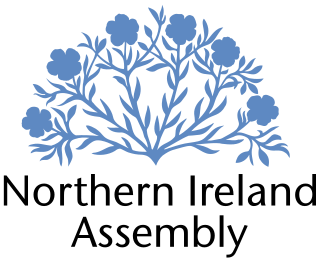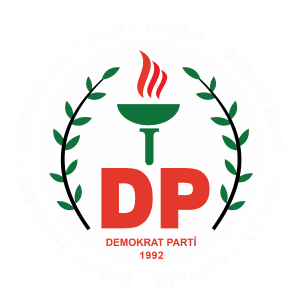
The Northern Ireland Assembly, often referred to by the metonym Stormont, is the devolved legislature of Northern Ireland. It has power to legislate in a wide range of areas that are not explicitly reserved to the Parliament of the United Kingdom, and to appoint the Northern Ireland Executive. It sits at Parliament Buildings at Stormont in Belfast.

The 1998 Northern Ireland Assembly election took place on Thursday, 25 June 1998. This was the first election to the new devolved Northern Ireland Assembly. Six members from each of Northern Ireland's eighteen Westminster Parliamentary constituencies were elected by single transferable vote, giving a total of 108 Members of the Legislative Assembly (MLAs).

The UK Unionist Party (UKUP) was a small unionist political party in Northern Ireland from 1995 to 2008 that opposed the Good Friday Agreement. It was nominally formed by Robert McCartney, formerly of the Ulster Unionist Party, to contest the 1995 North Down by-election and then further constituted to contest the 1996 elections for the Northern Ireland Forum. McCartney had previously contested the 1987 general election as an independent using the label Real Unionist.
The Peace and Democracy Movement was a social democratic political party in the de facto Turkish Republic of Northern Cyprus. In the legislative elections for the House of Representatives of Northern Cyprus on 20 January 2005 the party won 5.8% of the popular vote and 1 out of the 50 seats in the assembly.

The Republican Turkish Party is a social-democratic political party in Northern Cyprus. The party was founded in 1970 by Ahmet Mithat Berberoğlu, a lawyer, in opposition to the leadership of Fazıl Küçük and Rauf Denktaş.

At the national level, the Republic of Cyprus holds elections for its head of state, the President of Cyprus, and for its legislature, the House of Representatives.

The Democratic Party is a conservative political party in Northern Cyprus. The leader of the party is Fikri Ataoğlu.

Early parliamentary elections were held in Northern Cyprus on 20 February 2005, after the coalition government led by Mehmet Ali Talat lost its majority in the House of Representatives. The vote was a resounding victory for Mehmet Ali Talat's CTP-United Forces alliance, although it fell just short of a majority. The UBP, Democratic Party and BDH also crossed the 5% election threshold and won seats in the House.

Derviş Eroğlu is a Turkish Cypriot politician, who served as the president of Northern Cyprus from 2010 to 2015. Previously, he was Prime Minister from 1985 to 1994, 1996 to 2004 and again from 2009 to 2010 and twice-leader of the National Unity Party.

The Communal Liberation Party was a Left-wing political party in Northern Cyprus.

Elections in Northern Cyprus are organized to elect governments, presidents and representatives of local administrative bodies in Northern Cyprus, known as the Turkish Republic of Northern Cyprus.
Abstentionism is the political practice of standing for election to a deliberative assembly while refusing to take up any seats won or otherwise participate in the assembly's business. Abstentionism differs from an election boycott in that abstentionists participate in the election itself. Abstentionism has been used by Irish republican political movements in the United Kingdom and Ireland since the early 19th century. It was also used by Hungarian and Czech nationalists in the Austrian Imperial Council in the 1860s.

The Politics of Northern Cyprus takes place in a framework of a semi-presidential representative democratic republic, whereby the president is head of state and the prime minister is the head of government, and of a multi-party system. Executive power is exercised by the government. Legislative power is vested in both the government and the Assembly of the Republic. The judiciary is independent of the executive and the legislature.

The Assembly of the Republic is the parliament of the Turkish Republic of Northern Cyprus. It has 50 members, elected for a five-year term by mitigated proportional representation. A party must cross the electoral threshold to be awarded any seats. The parliament is composed of 50 MPs, chosen from six electoral districts, which are coterminous with the districts of Northern Cyprus: Lefkoşa, Gazimağusa, Girne, Güzelyurt, Lefke and İskele.

The Communal Democracy Party is a social-democratic political party in the Turkish Republic of Northern Cyprus. The party came into being in May 2007 as a merger of the Peace and Democracy Movement with the Communal Liberation Party. At the 2009 legislative elections for the Assembly of the Republic in the Turkish Republic of Northern Cyprus, the TDP, in its first elections, won 2 out of 50 seats and 6.87% of the popular vote. In 2013, it took part in the interim Siber cabinet with three ministers. At the 2013 legislative elections, the party increased its share of the vote to 7.41% and its number of MPs to 3. The TDP currently holds the mayorship of the Nicosia Turkish Municipality with Mehmet Harmancı.

Parliamentary elections were held in Northern Cyprus on 15 December 2003. Having come fourth in the 1998 elections, the Republican Turkish Party emerged as the largest party in the Assembly of the Republic, winning 19 of the 50 seats.

Parliamentary elections were held in Northern Cyprus on 28 July 2013, a year earlier than necessary. The Republican Turkish Party emerged as the largest in the Assembly of the Republic, winning 21 of the 50 seats.

Parliamentary elections were held in Northern Cyprus on 6 May 1990. The opposition Republican Turkish Party, Communal Liberation Party, Democratic People's Party, Social Democratic Party and New Dawn Party ran in an alliance known as the Party for Democratic Struggle to oppose the ruling National Unity Party (UBP). The UBP received 54.7% of the vote and won 34 of the 50 seats, whilst the DMP took the remaining 16 seats.

Parliamentary elections were held in Northern Cyprus on 7 January 2018 to elect the 50 members of the Assembly of the Republic for a five-year term. Going into the elections, the government was led by Prime Minister Hüseyin Özgürgün, who had served since 16 April 2016, leading a coalition consisting of the National Unity Party and the Democratic Party.

Snap parliamentary elections were held in Northern Cyprus on 23 January 2022. Going into the election, the government was led by Prime Minister Faiz Sucuoğlu of the National Unity Party (UBP). The Sucuoğlu cabinet, was formed in November 2021 and was a minority coalition government of the National Unity Party (UBP) and the Democratic Party (DP). It functioned as a caretaker government until the snap election.












